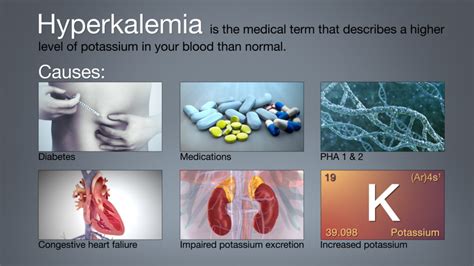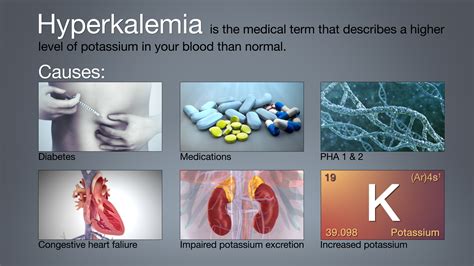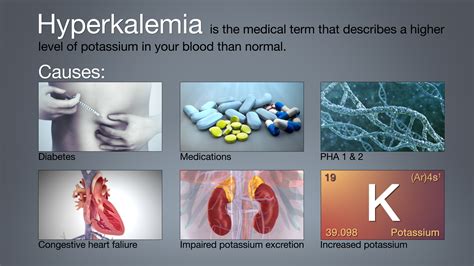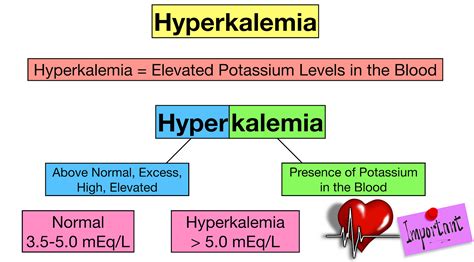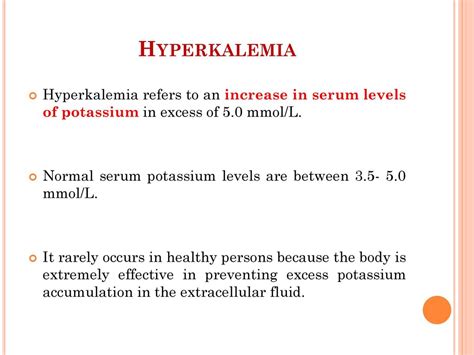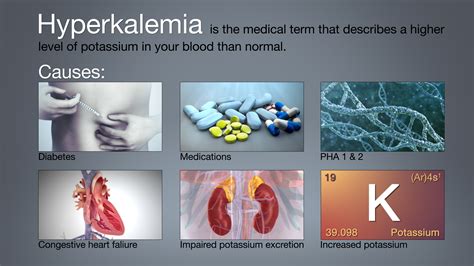Potassium is an essential mineral that plays a crucial role in various bodily functions, including muscle contraction, nerve function, and heart health. While potassium is vital for our well-being, excessive levels can lead to a range of symptoms and potentially life-threatening complications. In this article, we will delve into the world of potassium overload, exploring its causes, symptoms, and consequences, as well as providing guidance on how to manage and prevent this condition.
The importance of maintaining a balanced potassium level cannot be overstated. Potassium helps regulate fluid balance, blood pressure, and electrolyte levels, making it a vital component of our overall health. However, when potassium levels become too high, it can disrupt the delicate balance of our bodily functions, leading to a range of symptoms and potentially serious health issues. As we explore the world of potassium overload, it is essential to understand the causes, symptoms, and consequences of this condition, as well as the steps we can take to prevent and manage it.
Potassium overload, also known as hyperkalemia, occurs when the level of potassium in the blood exceeds 5.5 milliequivalents per liter (mEq/L). This can happen for a variety of reasons, including kidney disease, certain medications, and excessive dietary intake. As potassium levels rise, it can lead to a range of symptoms, from mild to severe, that can have a significant impact on our daily lives. In this article, we will explore the 7 potassium overload symptoms, providing a comprehensive overview of the causes, symptoms, and consequences of this condition, as well as guidance on how to manage and prevent it.
Potassium Overload Causes and Risk Factors
Potassium overload can occur due to a variety of causes and risk factors. Kidney disease is one of the most common causes of hyperkalemia, as the kidneys play a crucial role in regulating potassium levels. Certain medications, such as beta-blockers and ACE inhibitors, can also contribute to potassium overload. Additionally, excessive dietary intake of potassium-rich foods, such as bananas, avocados, and leafy greens, can lead to hyperkalemia. Other risk factors include adrenal gland disorders, cell breakdown, and certain medical conditions, such as heart failure and diabetes.
Potassium Overload Symptoms
The symptoms of potassium overload can vary from person to person, ranging from mild to severe. Here are 7 common symptoms of hyperkalemia:
* Muscle weakness: High potassium levels can cause muscle weakness, fatigue, and cramping.
* Palpitations: Potassium overload can disrupt heart function, leading to irregular heartbeats, palpitations, and arrhythmias.
* Numbness or tingling: High potassium levels can cause numbness or tingling sensations in the hands and feet.
* Abdominal cramping: Potassium overload can cause abdominal cramping, nausea, and vomiting.
* Shortness of breath: In severe cases, hyperkalemia can cause shortness of breath, respiratory failure, and cardiac arrest.
* Confusion and disorientation: High potassium levels can cause confusion, disorientation, and altered mental status.
* Paralysis: In extreme cases, potassium overload can cause paralysis, coma, and even death.
Diagnosing Potassium Overload
Diagnosing potassium overload typically involves a combination of physical examination, medical history, and laboratory tests. A healthcare provider may perform an electrocardiogram (ECG) to evaluate heart function and detect any irregularities. Blood tests, such as a complete blood count (CBC) and electrolyte panel, can help measure potassium levels and detect any underlying conditions. Urine tests may also be performed to evaluate kidney function and detect any signs of kidney disease.
Treating Potassium Overload
Treatment for potassium overload typically involves addressing the underlying cause and managing symptoms. In mild cases, treatment may involve dietary changes, such as reducing potassium intake and increasing calcium and magnesium consumption. Medications, such as diuretics and potassium-binding resins, may be prescribed to help lower potassium levels. In severe cases, hospitalization may be necessary to provide close monitoring and treatment, including cardiac monitoring, oxygen therapy, and emergency interventions.
Preventing Potassium Overload
Preventing potassium overload involves maintaining a balanced diet, staying hydrated, and managing underlying medical conditions. Here are some tips to help prevent hyperkalemia:
* Eat a balanced diet: Focus on consuming a variety of whole foods, including fruits, vegetables, whole grains, and lean proteins.
* Stay hydrated: Drink plenty of water and limit sugary drinks and caffeine.
* Manage underlying conditions: Work with your healthcare provider to manage underlying medical conditions, such as kidney disease and heart failure.
* Monitor potassium levels: Regularly monitor potassium levels, especially if you have a history of hyperkalemia or are taking medications that can affect potassium levels.
Potassium Overload Complications
If left untreated, potassium overload can lead to a range of complications, including cardiac arrest, respiratory failure, and even death. Other potential complications include:
* Kidney damage: High potassium levels can cause kidney damage and worsen existing kidney disease.
* Heart problems: Hyperkalemia can increase the risk of heart problems, including arrhythmias, heart failure, and cardiac arrest.
* Muscle weakness: Prolonged potassium overload can cause muscle weakness, fatigue, and muscle wasting.
Conclusion and Final Thoughts
In conclusion, potassium overload is a serious medical condition that requires prompt attention and treatment. By understanding the causes, symptoms, and consequences of hyperkalemia, we can take steps to prevent and manage this condition. If you suspect you or someone you know may be experiencing potassium overload symptoms, it is essential to seek medical attention immediately. With proper treatment and management, it is possible to prevent complications and maintain optimal health.
We invite you to share your thoughts and experiences with potassium overload in the comments below. Have you or someone you know been affected by hyperkalemia? What steps have you taken to manage and prevent this condition? Your feedback and insights can help others better understand and navigate this complex medical issue.
What are the symptoms of potassium overload?
+
The symptoms of potassium overload can include muscle weakness, palpitations, numbness or tingling, abdominal cramping, shortness of breath, confusion and disorientation, and paralysis.
How is potassium overload diagnosed?
+
Potassium overload is typically diagnosed through a combination of physical examination, medical history, and laboratory tests, including blood tests and electrocardiogram (ECG).
What are the complications of untreated potassium overload?
+
Untreated potassium overload can lead to a range of complications, including cardiac arrest, respiratory failure, kidney damage, heart problems, and muscle weakness.
How can I prevent potassium overload?
+
To prevent potassium overload, it is essential to maintain a balanced diet, stay hydrated, manage underlying medical conditions, and monitor potassium levels regularly.
What are the treatment options for potassium overload?
+
Treatment for potassium overload typically involves addressing the underlying cause and managing symptoms, and may include dietary changes, medications, and hospitalization in severe cases.
